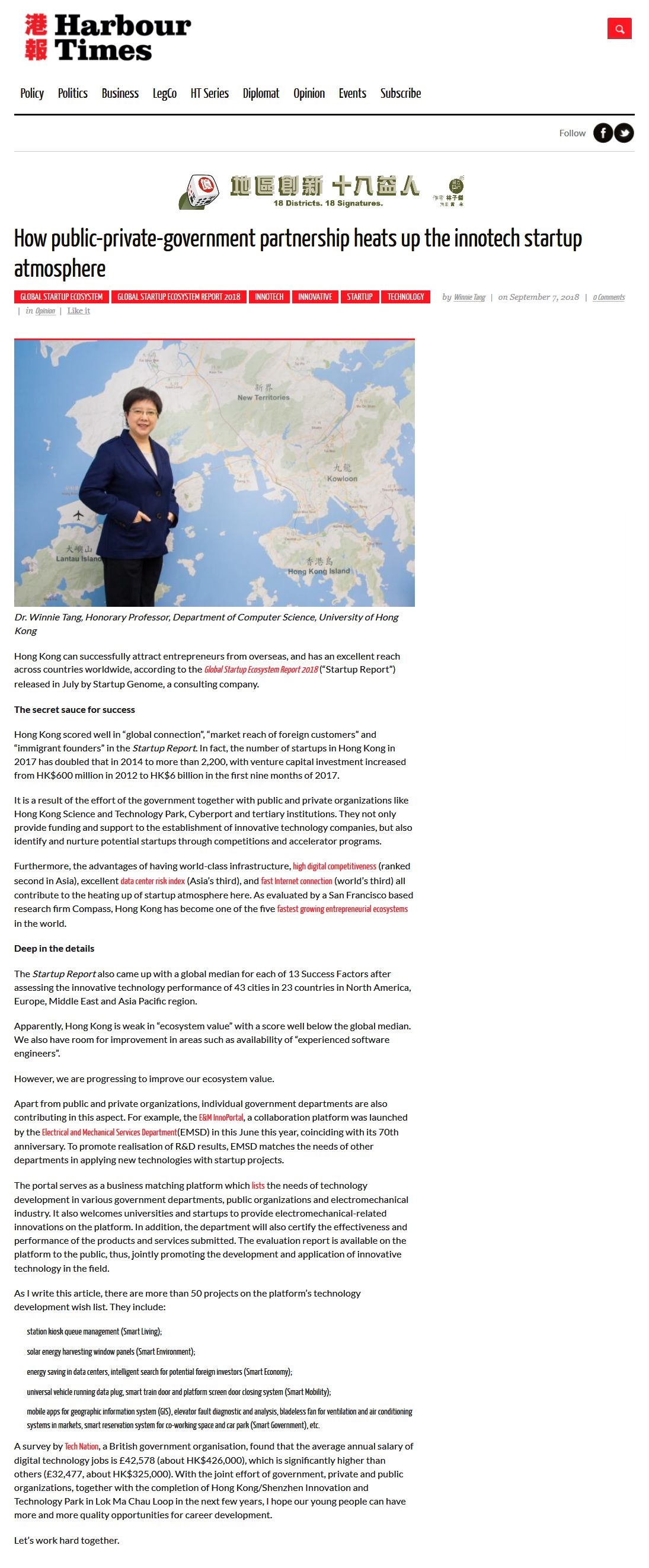網上版請按此

How public-private-government partnership heats up the innotech startup atmosphere
Hong Kong can successfully attract entrepreneurs from overseas, and has an excellent reach across countries worldwide, according to the Global Startup Ecosystem Report 2018 ("Startup Report") released in July by Startup Genome, a consulting company.
The secret sauce for success
Hong Kong scored well in "global connection", "market reach of foreign customers" and "immigrant founders" in the Startup Report. In fact, the number of startups in Hong Kong in 2017 has doubled that in 2014 to more than 2,200, with venture capital investment increased from HK$600 million in 2012 to HK$6 billion in the first nine months of 2017.
It is a result of the effort of the government together with public and private organizations like Hong Kong Science and Technology Park, Cyberport and tertiary institutions. They not only provide funding and support to the establishment of innovative technology companies, but also identify and nurture potential startups through competitions and accelerator programs.
Furthermore, the advantages of having world-class infrastructure, high digital competitiveness (ranked second in Asia), excellent data center risk index (Asia's third), and fast Internet connection (world's third) all contribute to the heating up of startup atmosphere here. As evaluated by a San Francisco based research firm Compass, Hong Kong has become one of the five fastest growing entrepreneurial ecosystems in the world.
Deep in the details
The Startup Report also came up with a global median for each of 13 Success Factors after assessing the innovative technology performance of 43 cities in 23 countries in North America, Europe, Middle East and Asia Pacific region.
Apparently, Hong Kong is weak in "ecosystem value" with a score well below the global median. We also have room for improvement in areas such as availability of "experienced software engineers".
However, we are progressing to improve our ecosystem value.
Apart from public and private organizations, individual government departments are also contributing in this aspect. For example, the E&M InnoPortal, a collaboration platform was launched by the Electrical and Mechanical Services Department(EMSD) in this June this year, coinciding with its 70th anniversary. To promote realisation of R&D results, EMSD matches the needs of other departments in applying new technologies with startup projects.
The portal serves as a business matching platform which lists the needs of technology development in various government departments, public organizations and electromechanical industry. It also welcomes universities and startups to provide electromechanical-related innovations on the platform. In addition, the department will also certify the effectiveness and performance of the products and services submitted. The evaluation report is available on the platform to the public, thus, jointly promoting the development and application of innovative technology in the field.
As I write this article, there are more than 50 projects on the platform's technology development wish list. They include:
station kiosk queue management (Smart Living);
solar energy harvesting window panels (Smart Environment);
energy saving in data centers, intelligent search for potential foreign investors (Smart Economy);
universal vehicle running data plug, smart train door and platform screen door closing system (Smart Mobility);
mobile apps for geographic information system (GIS), elevator fault diagnostic and analysis, bladeless fan for ventilation and air conditioning systems in markets, smart reservation system for co-working space and car park (Smart Government), etc.
A survey by Tech Nation, a British government organisation, found that the average annual salary of digital technology jobs is £42,578 (about HK$426,000), which is significantly higher than others (£32,477, about HK$325,000). With the joint effort of government, private and public organizations, together with the completion of Hong Kong/Shenzhen Innovation and Technology Park in Lok Ma Chau Loop in the next few years, I hope our young people can have more and more quality opportunities for career development.
Let's work hard together.
Dr. Winnie Tang
Honorary Professor, Department of Computer Science, The University of Hong Kong